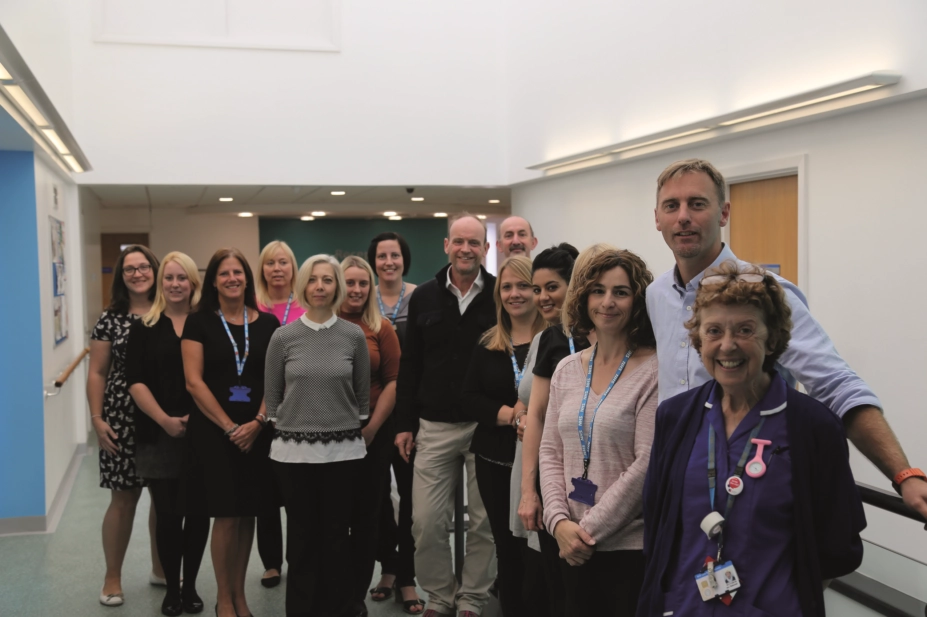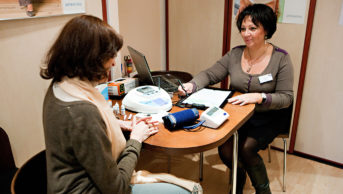
Courtesy of Bay Medical Group
As the NHS considers new ways to improve access to healthcare, increase patient satisfaction and obtain better clinical outcomes, the role of the pharmacist within primary care is becoming more important. The knowledge and skills possessed by pharmacists are becoming increasingly recognised and utilised to reduce the demand on doctors and nurses in key areas such as medicines management, supporting patients with long-term conditions and providing advice on minor ailments.
A pharmacist-led approach
Recognition and utilisation of these skills is evident at the Bay Medical Group (BMG), Lancashire, which has employed a team of pharmacists since April 2016. The Medicines Management Team (MMT) is an integrated part of the group and supports the acute and chronic disease management services offered to around 65,000 patients across six sites.
The MMT consists of six pharmacists, three senior technical staff and eight administrative medicines management operators (MMOs) overseeing repeat prescription administration and medicines management. The team also provides urgent care support. Engagement with Morecambe Bay Clinical Commissioning Group (CCG) occurs regularly at a monthly medicines optimisation forum (MOF) where a representative from BMG will attend and feed back to the MMT, who are also in regular email contact with the CCG commissioner about individual medicines requests and their various commissioned status.
Practice pharmacist Michael Cryan says the idea to involve pharmacists more closely in primary care actually goes back to 1999 when family health services authorities wanted them to have a greater role. “At the time, many GPs welcomed having a pharmacist on site to handle prescription queries,” says Cryan.
In Lancashire, the idea of integrating pharmacists within GP practices has remained popular and there has been a clamour to develop the idea ever since CCGs replaced Primary Care Trusts in 2013. When BMG was formed in 2016 following the decision to merge four GP practices across Morecambe and Lancaster, it made perfect sense to embed pharmacists into every aspect of primary care. Now whenever medicines are requested or prescribed, the decision-making is devolved to the MMT, which manages the administrative and clinical process including outpatient requests. “Pharmacists are a vital part of the practice, and decisions about medicines from patients, hospitals or a third party are at their discretion rather than a GP’s,” says Cryan. “For example, we are best placed to feed back to a hospital when it is requesting drugs that are not on its own formulary.”
The MMT is responsible for initiating new medicines, according to the locally commissioned joint formulary, and medical staff are involved if required. A patient’s usual GP will then receive documents highlighting what actions have been taken relating to any medication. The MMT are also able to identify problems with reconciliation of medicines on hospital discharge documents. For instance, a pharmacist will flag any changes to a patient’s medication if they are not present on their paperwork.
Sustainable collaboration
Communication with patients and other health professionals is vital in any practice. Administration queries from community pharmacists are handled by MMOs through a dedicated phone line. Any clinical queries are handled directly by an MMT pharmacist via a second line and patients can access pharmacy support through the main switchboard. Cryan explains that “patients are getting a better service because there is a pharmacist at the practice the whole time, not just for a couple of hours”. The MMOs also process prescription requests and follow written protocols to implement other MMT activities. These include CCG cost-effective switches, repeat prescriptions, record housekeeping activities, dressings, and appliances formulary management.
It will be the improvements to the GP service and doctors’ workload that will become the main key performance indicators when measuring the success of the MMT, including better budgetary control, easier access to GP appointments and more specialist clinic appointments with pharmacists. The feedback so far has been positive. Doctors appreciate how decisions are more evidence-based and can see there is better use of NHS medicines. They also welcome the reduction in paperwork as the group’s administration becomes increasingly electronic. The group has a ‘paper-light’ strategy and is already using the EMIS Web primary care clinical system, which holds patient medical records including all prescribing information electronically.
Ongoing developments and progression
However, one challenge for the group following the merger has been the lack of a centralised administration system. When GP practices merge, the patient record databases have to be merged in a phased process. This means individual sites have been unable to access each other’s records, but this should be resolved by October 2017. There is also a need for a centralised electronic prescription request system. The group receives about 12,000 requests per month, but still has to print paper at different sites and have a responsible prescriber at each location. BMG is encouraging community pharmacies to communicate electronically rather than using faxes, and it wants it to be easier for nursing homes to obtain NHS email addresses.
In April, York Bridge Surgery in Morecambe became the final local practice to be merged into the organisation. There are now plans to add more pharmacists to the MMT now that this site’s information technology and administration system are fully integrated. Any expansion of the pharmacy team will enable the MMT to become even more involved in chronic disease treatment and urgent care. Two pharmacists are already taking part in a national pilot scheme aimed at reducing GP appointments.
BMG operates an urgent care triage system for on-the-day appointments and care. An urgent care pharmacist joined the group in February and is working with other clinical practitioners to manage urgent calls related to medications. Many of the other pharmacists have been part of a triage team before and they will be involved in the examination, assessment and treatment of triage cases across the group. The urgent care pharmacists will be qualified advanced practitioners.
It is vital that within this unique business model, all members of the MMT can still achieve their career goals and CPD requirements. BMG offers internal and external training, with the aim being to provide all team members with the skills they need to offer relevant medicines management support. Senior MMOs are dispensary trained and supervise junior members of the team and oversee an induction programme for new starters.
Practice pharmacist Kerry Discua-Pyne joined Bay Medical Group this year. She had some experience of primary care but had worked in community pharmacy for 17 years. She says there must be mutual respect between GPs and pharmacists for this type of business and care model to work. She admits that some doctors are not always aware of the skills pharmacists have and how they can help. “We are all part of the same team with the same goals. This is a great way for me to progress my career and take some pressure off GPs,” she says. “I like the MMT because it is more clinical. We can help rationalise medicines use and encourage patients in self-care.” Initially she was hesitant about the MMT because she was worried she would miss the patient contact she enjoyed in community pharmacy. “However, I am still talking to people on the phone and more face-to-face conversations will come as the MMT develops. My job has a different dynamic now around patient safety.”
Fellow practice pharmacist Dan Holehouse has been working with GPs for a number of years but says the MMT approach is very different and creates a central hub for people to receive advice on medicines and care. He says it is also a place to train new GPs on guidelines and good prescribing. He adds that GP attitudes have changed a lot over the years. “In the early days of medicines management, we had to engage GPs’ attention and today the GPs actively seek our advice and support,” he says. “Doctors have gradually appreciated the value we bring and I am now getting asked by other practices around the country for advice on setting up a similar business model.”
Doctors’ perceptions
So how do the GPs at BMG feel about the MMT and the effect it is having on their day-to-day work? Dr Robin Sykes believes there are no negative aspects to pharmacist integration and he welcomes the cost and time benefits he is seeing. He appreciates the pharmacists’ proactive approach to making the MMT work and the specific support they provide. This includes contacting patients to advise them on alternative and more cost-effective medications. “There has been a huge reduction in the amount of paperwork I have to deal with. For example, the pharmacists are adding medicines management details and contacting the hospital before passing the notes on to me,” he says. “And when we get letters from hospitals with medications we are unfamiliar with, we have specialist pharmacists on hand to provide advice.”
He says that as the MMT has become more established, patients have started to take the information as seriously as if it came from their doctor. “Everyone recognises the pharmacist’s value and all GPs need to support their role in primary care,” says Dr Sykes.
Box 1: The growing demand for pharmacists in primary care
The shortage of GPs, has in part resulted in a decision by Argyle Health Group (AHG) in London to set up a pharmacist-led practice.
Chief operating officer Dr Farid Fouladinejad says AHG wants to recruit clinical pharmacists as part of its plan to have a diverse multidisciplinary team working across the boroughs of Ealing and Hounslow in North West London.
The company has acquired a GP practice in Isleworth and is advertising on NHS Jobs for five experienced GP Pharmacists to work full- and part-time.
“There is a shortage of suitably qualified GP’s and practice nurses so we are seeking other healthcare professionals including pharmacists and pharmacy technicians who have the suitable skills to work within primary care,” he says. “This combined effort will ensure that patients will receive the right care at the right time from a clinical professional.”
Reading this article counts towards your CPD
You can use the following forms to record your learning and action points from this article from Pharmaceutical Journal Publications.
Your CPD module results are stored against your account here at The Pharmaceutical Journal. You must be registered and logged into the site to do this. To review your module results, go to the ‘My Account’ tab and then ‘My CPD’.
Any training, learning or development activities that you undertake for CPD can also be recorded as evidence as part of your RPS Faculty practice-based portfolio when preparing for Faculty membership. To start your RPS Faculty journey today, access the portfolio and tools at www.rpharms.com/Faculty
If your learning was planned in advance, please click:
If your learning was spontaneous, please click:


